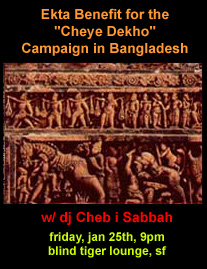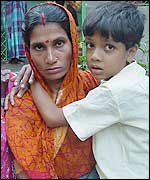|
 EKTA
BENEFIT FOR THE EKTA
BENEFIT FOR THE
"CHEYE DEKHO" CAMPAIGN IN BANGLADESH
SAN FRANCISCO - Ekta is arranging
a benefit for Drishtipat's "Cheye Dekho Campaign". Dj Cheb
i Sabbah will be spinning at the Blind Tiger Lounge on Jan
25 Friday at 9:00pm to raise funds for the benefit. By January
31, 2002, Drishtipat's "Cheye Dekho Campaign" plans to raise
$25,000. The funds raised through the campaign will be used
for the rehabilitation of victims at Annada Prashad, raise
awareness of current minority related human rights abuses
at Annada Prashad and elsewhere in Bangladesh and lobby the
Bangladesh government to take action.
 Recently,
there has been an outburst of minority related human rights
abuses in Bangladesh. Many minority communities have been
attacked. On October 2-3, 2001, minority Hindu residents of
the remote Bangladesh village of Annada Prashad were subjected
to intolerable human rights abuses. Almost two hundred women
were raped and the local power elite rendered hundreds of
families homeless in organized attacks. Similar incidents
have also happened at other places in Bangladesh. In Patuakhali,
22 Hindu women were raped and forced to walk naked in public
on Oct 3, 2001 (Mayer Dak News Service). On October 10 resident
minority groups were attacked in several villages in Pabna
district. Hindus who have been living in those areas for generations
were told to leave the country or face "dire consequences".
At least 400 minority families in Sujanagar in Pabna reportedly
fled their homes (The Daily Star). In all of these incidents
the police and the government have often remained indifferent
towards the attacks. Recently,
there has been an outburst of minority related human rights
abuses in Bangladesh. Many minority communities have been
attacked. On October 2-3, 2001, minority Hindu residents of
the remote Bangladesh village of Annada Prashad were subjected
to intolerable human rights abuses. Almost two hundred women
were raped and the local power elite rendered hundreds of
families homeless in organized attacks. Similar incidents
have also happened at other places in Bangladesh. In Patuakhali,
22 Hindu women were raped and forced to walk naked in public
on Oct 3, 2001 (Mayer Dak News Service). On October 10 resident
minority groups were attacked in several villages in Pabna
district. Hindus who have been living in those areas for generations
were told to leave the country or face "dire consequences".
At least 400 minority families in Sujanagar in Pabna reportedly
fled their homes (The Daily Star). In all of these incidents
the police and the government have often remained indifferent
towards the attacks.
 We
would also like to note that these human rights related abuses
of minority communities are not unique only to Bangladesh.
Elsewhere in South Asia, such as India, Sri Lanka, Pakistan,
Bhutan and Nepal minority related human rights abuses abound.
In India, a gang of upper caste landlords, the Ranvir Sena,
have openly claimed responsibility for massacring entire Dalit
villages in Bihar, and the overall oppression of Dalits in
India continues. The Hindutva forces in India continue to
carry out reprisals against Muslim communities the worst of
which occurred in Bombay's "cosmopolitan" business center
following the Babri Masjid demolition. Hindutva forces also
carried out a backlash against the Adivasi Christian community
in Orissa. Villages in Kashmir, Assam, Karnataka, and Nagaland
continue to be persecuted for their suspected involvement
in separatist movements. In Pakistan, the Christians and the
followers of the Amadi sect face persecution. In Nepal and
Bhutan, supporters of the Maoist rebellion are victimized.
In Sri Lanka, the ruling Singhalese continues to repress the
Tamils. We
would also like to note that these human rights related abuses
of minority communities are not unique only to Bangladesh.
Elsewhere in South Asia, such as India, Sri Lanka, Pakistan,
Bhutan and Nepal minority related human rights abuses abound.
In India, a gang of upper caste landlords, the Ranvir Sena,
have openly claimed responsibility for massacring entire Dalit
villages in Bihar, and the overall oppression of Dalits in
India continues. The Hindutva forces in India continue to
carry out reprisals against Muslim communities the worst of
which occurred in Bombay's "cosmopolitan" business center
following the Babri Masjid demolition. Hindutva forces also
carried out a backlash against the Adivasi Christian community
in Orissa. Villages in Kashmir, Assam, Karnataka, and Nagaland
continue to be persecuted for their suspected involvement
in separatist movements. In Pakistan, the Christians and the
followers of the Amadi sect face persecution. In Nepal and
Bhutan, supporters of the Maoist rebellion are victimized.
In Sri Lanka, the ruling Singhalese continues to repress the
Tamils.
In these incidents while
the oppressed minority communities vary from country to country,
what is common is that within each country, the dominant community,
often with the connivance of the local police and government,
is frequently responsible for abusing the rights of people
in minority communities. What we would also like to stress
is that women and children of minority communities experience
added abuse as violent attacks are often specifically directed
towards them.
 Alongside
these violent outbursts of oppression, there have been positive
efforts. What should be recognized is that many NGOs (e.g.
Drishtipat), civil society organizations (e.g. Mahila Parishad,
Ain-O-Shalish Kendra), institutions (e.g. Fair Election Monitoring
Alliance, Sachetan Nagorik Samaj) and individuals (e.g. journalist
Shahriar Kabir) have been productively active in drawing attention
to these recent violent outbursts against the minority communities
in Bangladesh. While the fund we raise will rehabilitate victims
of oppression on minority communities only at Annada Prashad,
through our work we would like to draw attention to human
rights abuses throughout South Asia and to show our support
and appreciation for the people and organizations working
to prevent it. Alongside
these violent outbursts of oppression, there have been positive
efforts. What should be recognized is that many NGOs (e.g.
Drishtipat), civil society organizations (e.g. Mahila Parishad,
Ain-O-Shalish Kendra), institutions (e.g. Fair Election Monitoring
Alliance, Sachetan Nagorik Samaj) and individuals (e.g. journalist
Shahriar Kabir) have been productively active in drawing attention
to these recent violent outbursts against the minority communities
in Bangladesh. While the fund we raise will rehabilitate victims
of oppression on minority communities only at Annada Prashad,
through our work we would like to draw attention to human
rights abuses throughout South Asia and to show our support
and appreciation for the people and organizations working
to prevent it.
Special
thanks to dj Cheb i Sabbah
 Born
in Algeria, dj CHEB i SABBAH began spinning in Paris
in 1964. In the late 80's he became a fixture on the club
scene in San Francisco and since 1990 has produced 50 plus
concerts in the U.S. as part of his groundbreaking 1002 Nights
Live series including performances by Nusrat Fateh Ali Kahn,
jazz trumpeter Don Cherry and Rai singers Fadela and Sahraoui,
Cheba Zahouania, Cheb Hasni, and Cheb Nasro. Cheb i Sabbah
may have helped to create the DJ phenomenon, but also stands
apart from it. His passion for bringing the great traditions
of Asia, Arabia and Africa to the immigrants of those continents
and to Western listeners led to the release of his two albums
Shri Durga and MahaMaya and the forthcoming Krishna Lila on
Six Degrees Records. Born
in Algeria, dj CHEB i SABBAH began spinning in Paris
in 1964. In the late 80's he became a fixture on the club
scene in San Francisco and since 1990 has produced 50 plus
concerts in the U.S. as part of his groundbreaking 1002 Nights
Live series including performances by Nusrat Fateh Ali Kahn,
jazz trumpeter Don Cherry and Rai singers Fadela and Sahraoui,
Cheba Zahouania, Cheb Hasni, and Cheb Nasro. Cheb i Sabbah
may have helped to create the DJ phenomenon, but also stands
apart from it. His passion for bringing the great traditions
of Asia, Arabia and Africa to the immigrants of those continents
and to Western listeners led to the release of his two albums
Shri Durga and MahaMaya and the forthcoming Krishna Lila on
Six Degrees Records.
For more information, visit
http://www.ektaonline.org/events/banglabenefit/
|
